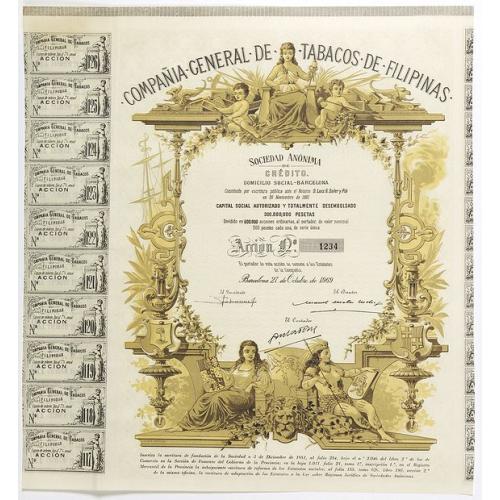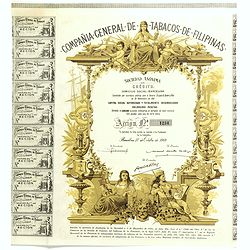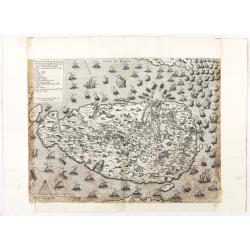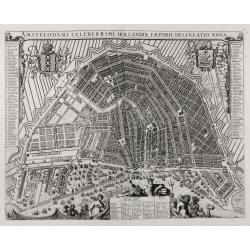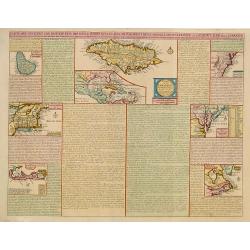Compania General De Tabacos De Filipinas - (Certificate) Accion ordinarias de 500 Pesetas, Barcelona, 27.10.1969. |
||||||||||||||||||||
|
||||||||||||||||||||
|
|
||||||||||||||||||||
$175 / ≈ €154This item is available for immediate sale! Questions before Buying ?
We are happy to answer your questions. Feel free to contact us if you have a question about this item.
Or do you like to be notified about newly added items? Add your name to our mailing list.
175.00
|
||||||||||||||||||||
Description
Tabacalera was the popular name of Compañia General de Tabacos de Filipinas S.A. - Compañia de Filipinas - which was founded in November 26, 1881 by a Spaniard from Santander, Antonio Lopez Lopez, the first Marques of Comillas.
He was a financial genius who parlayed his work adventures in Cuba and Latin America into a steamship companies and trading businesses. He was the most influential Spanish businessman of his generation and counted the Prime Minister and the King as his personal friends.
Tabacalera was a private enterprise he founded with the sole intention of taking over the Philippine Tobacco Monopoly from the Spanish colonial government. Its incorporators were the Sociedad General de Credito Inmobiliario Español, Banque de Paris and Bank of the Netherlands. It was founded to take over the tobacco factories that the Spanish government possessed in the islands, as well as to develop agriculture, trade, and industry.
Tabacalera was one of the oldest leaf tobacco dealers in the world and the first Spanish trading company to be quoted on the stock exchange of both Madrid and Barcelona.
Tabacalera dedicated itself to exporting tobacco from the Philippines to the Spanish Tobacco Monopoly. During its heyday, Tabacalera exercised almost monopolistic control over the whole Philippine tobacco leaf industry. It took over 5 tobacco plants from the colonial government but soon opened a start of the art factory in 1895 called La Flor de la Isabela.
It opened distribution and logistics operations to sort, trade, and prepare tobacco and acquired properties in San Antonio, Santa Isabel and San Luis in Cagayan Valley. It also established a shipping company Compañia Transatlantica and Tabacalera Insurance Co..
It expanded into many non-tobacco activities and grew rapidly until the Philippine Revolution of 1898. With the American colonial government as a new master in the Philippines, Tabacalera lost its special status in the island and had to adjust to the competitive pressures of the world market.
Nevertheless, it expanded into abacca, copra, sugar, interisland shipping and liquor. It established Hacienda Luisita and founded La Flor de la Isabela, one of the biggest cigar factories in the world. After World War I, it plowed its investments into sugar milling and rice trading. It enjoyed a boom in revenues and profits even as its tobacco exports declined, which its sugar and copra businesses more than made up for. It became the Philippines' biggest sugar and coconut exporter. At its peak, it became the biggest Philippine employer. Hacienda Luisita alone employed more than 6,000 Filipino and 200 Spanish nationals.
From 1900 to 1940 Tabacalera's fortunes went boom and bust with the Philippine economy and was subjected to the many sugar quotas imposed by the US Congress. At the end of World War II the company's installations were destroyed, but slowly the businesses were rebuilt. From the 1950s to the 1970s, Tabacalera experimented with expanding into other international regions such as Latin America, France, and Indonesia.
Its main lines of business were the export of tobacco to Algeria, Belgium, Morocco, Switzerland, Germany and Spain, the cultivation of sugar cane (centered in San Carlos, Negros and the Central Azucarera in Basi, Negros, import-export between southeast Asia and Europe, and the representation of European products in the Philippines, such as Renault, General Electrica Española and Sociedad Española de Construccion Naval, among other.
Unlike other American trading companies, Tabacalera specialized in dealing with dark air-cured tobacco, an increasingly difficult product to market in the competition of light Virginia leaf offered by American companies. Its near monopoly position in the Philippines and its hegemony over the economy (at one time, Tabacalera duties supplied more than 30% of Philippine government revenues) deteriorated rapidly past the 1970s.
Tabacalera's operations in Barcelona were eventually bought out by Altadis and the Spanish company ceased operations as an independent company. Tabacalera's operations in the Philippines are much reduced and are headquartered in Romualdez Street, Manila.
Being the leading Philippine company of its day, Tabacalera sponsored many cultural activities. It established many schools for its workers. It collected ethnological items for the famous 1887 Exposition General de las Islas Filipinas in Madrid, Spain. In 1883 it created the most magnificent Filipiniana library in its headquarters in Ramblas Barcelona, with no other than the leading bibliographer of the day Wenceslao E. Retana.
Please note: This item is a collectible only and does not represent ownership in the company. This item is either canceled and in case it is not, it represents an entity that no longer legally exists.
Reference: Aparato Bibliográfico de la Historia General de Filipina. Coleccion General de Documentos existentes en el Archivo General de Indias.
FAQ - Guarantee - Shipping
Buying in the BuyNow Gallery
This item is available for immediate purchase when a "Add to Cart" or "Inquire Now" button is shown.
Items are sold in the EU margin scheme
Payments are accepted in Euros or US Dollars.
Authenticity Guarantee
 We provide professional descriptions, condition report (based on 45 years experience in the map business)
We provide professional descriptions, condition report (based on 45 years experience in the map business)
Paulus Swaen warrants the authenticity of our items and a certificate of authenticity is provided for each acquired lot.
Condition and Coloring
We indicate the condition of each item and use our unnique HiBCoR grading system in which four key items determine a map's value: Historical Importance, Beauty, Condition/Coloring and Rarity.
Color Key
We offer many maps in their original black and white condition. We do not systematically color-up maps to make them more sellable to the general public or buyer.
Copper engraved or wood block maps are always hand colored. Maps were initially colored for aesthetic reasons and to improve readability. Nowadays, it is becoming a challenge to find maps in their original colors and are therefor more valuable.
We use the following color keys in our catalog:
Original colors; mean that the colors have been applied around the time the map was issued.
Original o/l colors; means the map has only the borders colored at the time of publication.
Colored; If the colors are applied recently or at the end of the 20th century.
Read more about coloring of maps [+]
Shipping fee
A flat shipping fee of $ 30 is added to each shipment by DHL within Europe and North America. This covers : International Priority shipping, Packing and Insurance (up to the invoice amount).
Shipments to Asia are $ 40 and rest of the world $50
We charge only one shipping fee when you have been successful on multiple items or when you want to combine gallery and auction purchases.
Read more about invoicing and shipping
FAQ
Please have a look for more information about buying in the BuyNow gallery
Many answers are likely to find in the general help section.
Virtual Collection
![]()
With Virtual Collection you can collect all your favorite items in one place. It is free, and anyone can create his or her Virtual map collection.
Unless you are logged in, the item is only saved for this session. You have to be registed and logged-in if you want to save this item permanently to your Virtual Collection.
Read More[+]
Register here, it is free and you do not need a credit card.
Add this item to
Virtual Collection
or click the following link to see my Virtual Collection.
| High-Resolution Digital Image Download | |
|
Paulus Swaen maintains an archive of most of our high-resolution rare maps, prints, posters and medieval manuscript scans. We make them freely available for download and study. Read more about free image download |
In accordance with the EU Consumer Rights Directive and habitually reside in the European Union you have the right to cancel the contract for the purchase of a lot, without giving any reason.
The cancellation period will expire 14 calendar days from the day after the date on which you or a third party (other than the carrier and indicated by you) acquires, physical possession of the lot. To exercise the right to cancel you must inform Paulus Swaen Europe bv, which is offering to sell the lot either as an agent for the seller or as the owner of the lot, of your decision to cancel this contract by a clear statement (e.g. a letter sent by post, or e-mail (amsterdam@swaen.com).
To meet the cancellation deadline, it is sufficient for you to send your communication concerning your exercise of the right to cancel before the cancellation period has expired.
